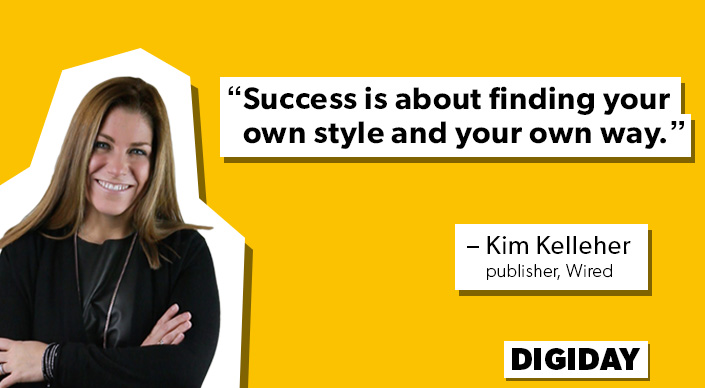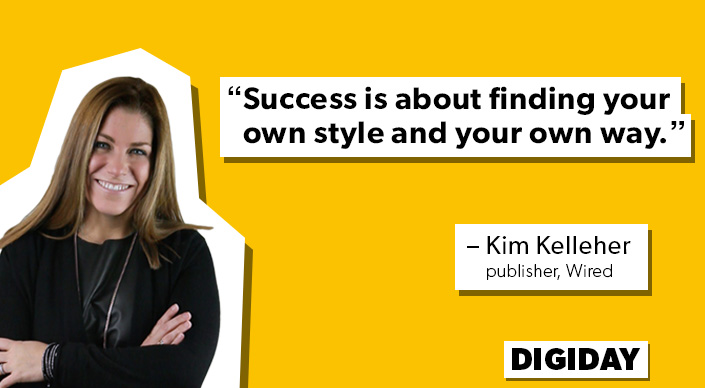
This is “View from the Top,” the latest in a Digiday series featuring creative leaders talking about their career paths and leadership perspectives. Read previous interviews here.
Kim Kelleher’s career may have brought her to one the most iconic magazine brands in the world, but the Wired publisher has some simple advice for anyone plotting a similar path: Work hard, and don’t let success change you.
“There’s an important sensibility that comes with staying grounded,” said Kelleher, who joined Wired in September after a year as president of Say Media. “I’ve always felt more comfortable being consistently myself than acting in new, different environments.”
Kelleher, who became the first female publisher of Sports Illustrated in 2010, spoke to Digiday about her small-town origins, the importance of legacy magazine brands and why this might be the best time for women in the publishing and advertising industries.
You’ve worked at Sports Illustrated, Time and now Wired. What attracts you to these big brands?
There is a richness to them that’s very personal to me. It’s a special thing for a brand to become large enough so that it’s an adjective or in the common vocabulary of people in this country. I’m fascinated by it. One of the things that influences that is time. While I see a lot new brands that are so interesting and have so much potential, there’s an aspect to the longevity that some of these legacy brands have had and how they’ve built themselves brick-by-brick or pixel-by-pixel over the years. That can’t be replicated short term.
Why come to Wired, specifically? It’s one of the few media brands that can have its own retail store, for example.
The Wired Store is definitely a plus! When I took this job, [my predecessor] Howard Mittman reminded me of a conversation that we had six years ago, where he asked me: “Hypothetically, if you couldn’t publish the magazine you’re publishing now, where you would be?” And I told him I’d be at Wired. I do think that it was a self-fulfilling prophecy. I’m excited to be here. It’s the only brand I would have come back to Condé for. It’s where I want to be.
How did you get started?
I’m from a town of three hundred people in Wisconsin. I went to the University of Wisconsin Madison, because it was the biggest school that I got into. Big is important when you’re from very small. My aspiration graduating there was getting to NYC. I was lucky enough, as a Russian History major, to land a job at a startup magazine called Elle Decor. I was the advertising secretary. It was a fateful first job that I’m very thankful for.
You consider yourself lucky?
I don’t consider luck that much of a factor in a lot of people’s careers, and I know people toss it around often. But when I think of luck, I think of me landing in advertising as my first job. Everything else I’ve worked for since.
What’s wrong with talking about luck?
A lot of people say they’re lucky as shorthand for “I’ve worked my butt off” and earned this. I don’t think the two things are synonyms.
But you think that luck was a big factor in your career?
I feel lucky that my first job was in advertising because I loved it. I just loved it. I loved the social aspect that I still think is alive and well. It’s a very people-focused business and the best part of my day are the people I work with and the people I work for, the clients. It’s a relationship-driven business despite the advent of programmatic, and that part will always be here to stay.
Back to your first job. Did any of your early bosses give you any leadership lessons that are still relevant to you?
I’ll never forget the first lunch I had with an early boss of mine at Elle Decor. He’s no longer in the industry, but he was a great salesperson. He took me out to my first big business lunch. I was 21 years old. He picked up a spoon and said, “Do you want to have a career in sales?” and I said “Yes, I do.” So he said “You need to be prepared to sell me this spoon off this table right now. Why do I need this spoon? Will it help me eat my meal? Wouldn’t a fork be just fine? Why does it have to be a spoon?” I’ve worked with a lot of greats, but I also think that success is about finding your own style and your own way. Eyes wide, ears open, but find your own way.

So what is your own way?
For me, it’s about being incredibly comfortable with who you are as a person and consistently be that. I would say I haven’t changed from the person I started out as, a person from a very small town in the midwest who still loves going home. I have always been in touch with the fact that that’s where most people are from and thats how most people live. There is a lot of space between the coasts.
Has being a woman made that harder to do in this industry?
It has been in the past, but I can honestly say that being a woman in the industry now is a benefit. While I’ve always had people I watched and whom I appreciated, the concept of the mentorship didn’t actually take on a more concrete value to me until I was in my late thirties. I have more female mentorship relationships now than I ever had in my career. I feel like there’s a concerted effort behind women helping women, and that’s not to the detriment of men at all. I feel momentum behind women helping women at the senior executive level. I’ve never felt that in my career.
What’s changed?
It’s a combination of me being comfortable enough with being vulnerable and recognizing that help is help and we should take it when we can. It’s also a combination of women reaching senior positions and seeking other women in senior positions out. That’s happening actively in media and advertising. It feels very different. I don’t know if I’m a new member of the club or the club is forming in real time, but it feels really good
What did it mean to be the first female publisher of Sports Illustrated ?
It meant a lot. It was important to me as an athlete. I feel like women have been underrepresented in sports and sports media, so it also felt like a responsibility. It felt like it mattered, and it felt like I made a difference for any woman who is looking to make a name in sports or looking to hit a certain achievement in sports management or sports media. That was something I was very proud to be a part of.
What’s some advice you would give to someone trying to get to where you are?
Work hard. I don’t want to oversimplify this, but work hard. It matters. People notice. Be bold and be thoughtful. With a combination of those three things, you will be successful.
More in Media

Digiday+ Research: Dow Jones, Business Insider and other publishers on AI-driven search
This report explores how publishers are navigating search as AI reshapes how people access information and how publishers monetize content.

In Graphic Detail: AI licensing deals, protection measures aren’t slowing web scraping
AI bots are increasingly mining publisher content, with new data showing publishers are losing the traffic battle even as demand grows.

In Graphic Detail: The scale of the challenge facing publishers, politicians eager to damage Google’s adland dominance
Last year was a blowout ad revenue year for Google, despite challenges from several quarters.





